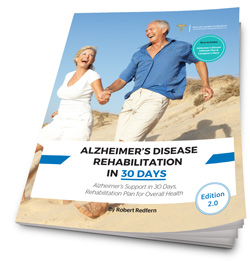Health News (Week 50 – 2019)
By Robert Redfern

Firstly, Anne and I wish you and your family a very Happy Christmas or Holiday Season, whatever you choose to celebrate at this time of year. We are always here to support you, 52 weeks of the year.
Our 50th Wedding Anniversary is coming around in the next couple of months and we just realised that 30 years of that has been helping people with their health care. The weird thing is that at aged 74 on my next birthday, I am healthier now than 30 years ago. To be clear I follow the health care plan in my books!
It’s That Time of the Year
Take extra care with so much festive food and drink around but there are two things you can do to alleviate health problems and one of them is very simple – sodium bicarbonate.
Sodium bicarbonate or baking soda is one of the wonderful health care solutions that is mainly ignored by both the public and the medical system. There are three hospitals that have come to my attention who use sodium bicarbonate:
- Manchester Royal Hospital
- Royal Preston Hospital Lancashire
- Royal London Hospital
If you use the search engine www.DuckDuckGo.com (unlike Google this search engine does not censor) using the name of the hospital and sodium bicarbonate you will see their public uses.
You may ask, why do these famous hospitals use an effective 10 cents treatment but your hospital does not? My answer is the bulk of the healthcare system is corrupted by the Pharma/Medical Cartel.
All you need to do to get the health benefits is to drink 6 x 500ml (16oz) glasses of water over the day with a 1/3rd teaspoon of sodium. It is best taken 30 mins before and 30 mins after each meal.
Eat, Drink and be Merry But Take Sodium Bicarbonate To be Healthy!
It’s D for Health?
I am on a call tomorrow being interviewed by a Radio Station in the USA as to why Vitamin D is essential for winter months. I will, of course, make the point that it is also essential in the summer for those who do not sunbathe in a swimsuit.
Those of colour are particularly at risk as they need to be in the sun longer to get the required Vitamin D. The darker the skin, the longer is needed to sunbathe.
These are the basic scientific facts of D3 production and supplementation:
- To get D3 you must sunbathe or supplement to prevent diseases. This is not very easy for many reasons.
- Your skin colour is important; the paler your skin, the faster you produce D3 and the darker your skin, the longer you need sun exposure to get your D3.
- The time of day is critical – your skin produces more vitamin D if you expose it during the middle of the day, so in the summer, just 30-60 minutes is sufficient for most skin types.
- The time of year is important, as winter does not enable D3 production unless you live near to the equator and so you must take a supplement.
- Even if you live near the equator, if you do not sunbathe in a bikini or brief swimsuit (for example, women for religious reasons), you are at risk and so you must supplement. The more skin you expose to the sun, the more vitamin D your body will produce.
- I recommend taking between 5000iu to 10,000iu per day, except for the few days you are sunbathing as mentioned above.
The Health Problems and Diseases Caused by D3 Deficiency
1. Vitamin D3 supplementation is needed by both parents for fertility, throughout pregnancy, and is especially critical for babies as soon as they are weaned.
Vitamin D3: At The Forefront Of The Battle Against Disease
Recent studies proving vitamin D3’s health benefits and immune-boosting qualities are legion. One of these, by University College London Institute of Child Health, found vitamin D3 deficiency is ‘largely being overlooked by our health professionals.’
Breastfed Babies Need Vitamin D3 After One Year
Breastfed babies should be given a Vitamin D3 supplement after the age of one year, according to a new study.
Male infertility
A new RCT found supplementing infertile men with vitamin D improved their partner’s birth success rate, despite not affecting overall semen quality.
2. Vitamin D3 Levels Are Important To Prevent Heart Diseases
Are You Getting Enough? Why You Should Take More Vitamin D3…
Researchers have analysed studies into Vitamin D and found that this essential vitamin can help to reduce heart disease while lowering any signs of exertion.
3. Eyesight And Especially Macular Degeneration Are Risk Factors For Low D3…
Lower Vitamin D3 Levels May Increase Risk Of Macular Degeneration
from Angers University Hospital in France believe that there is an increased risk of developing Age-Related Macular Degeneration (AMD) in those who have low levels of Vitamin D3.
Vitamin D3 Deficiency Linked With Increased Risk Of Alzheimer’s Disease And Dementia
Alzheimer’s Disease and Dementia are some of the biggest health risks for people in the modern world. 44 million cases are diagnosed worldwide and this is expected to triple by 2050.
Flu? Looking For An Amazing Fighter? Try Vitamin D3
From colds and flu to cancer, this remarkable vitamin can help all manner of health problems. Vitamin D3’s health benefits and immunity-boosting capabilities are beginning to receive the attention they deserve. The evidence from studies is piling up.
Vitamin D Deficiency May Increase The Risk Of Multiple Sclerosis
Vitamin D deficiency and multiple sclerosis risk (MS) may be strongly linked, new evidence has emerged. A recent study in Neurology indicates that women with Vitamin D deficiency are at higher risk of developing MS (by 43%).
And if you want to see articles simply search Vitamin D3 in www.NaturallyHealthyNews.com to see all of my articles containing D3.
These products contact Vitamin D3 with a daily dose as shown:
|
D3 = 3000IU |
D3 = 4000IU |
D3 = 5000IU |
|
Serranol™ contains 160,000IU Serrapeptase, 250mg Meriva Curcumin, 50mg Ecklonia Cava Extract and 1000IU Vitamin D3.
|
VitaminD3™ contains 4000IU of Vitamin D3 along with 100mg of Calcium from coral per capsule.
|
Vitamin D3 and K2 Spray™ contains 1000IU of Vitamin D3 per serving plus 100mcg of Vitamin K2 MK7 in a sublingual supplement.
|
|
Recommended Dosage:
3 capsules, up to 3 times daily. |
Recommended Dosage:
1 capsule of VitaminD3™ 4000IU daily. |
Recommended Dosage:
5 sprays per day, orally, or sprayed onto food. |
Remember:
You need to supplement to get the same amount of D3 as you should get in nature. The amount recommended by the Pharma/Medical Cartel is strongly disputed by most independent health researchers.







